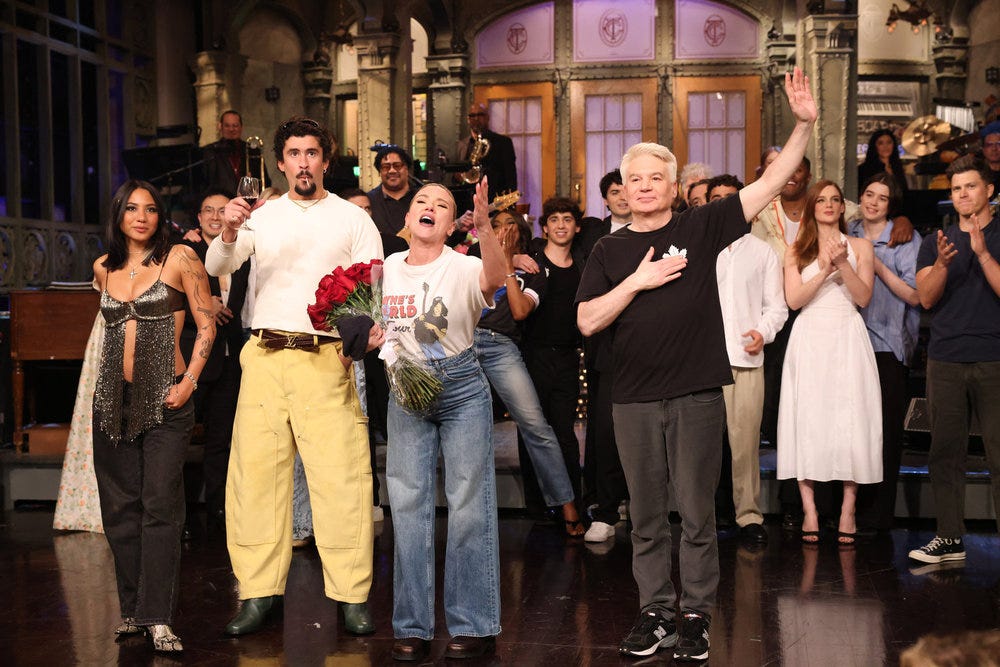Saturday Night Live concludes 50th season at a crossroads
Can the show remain relevant in an increasingly divided culture?

Saturday Night Live concluded its landmark 50th season with a finale that had the potential for greatness.
The ingredients were there, starting with Scarlett Johansson, a deft comic performer who has now hosted the show more than any other woman (including Tina Fey) and also happens to be married to Weekend Update anchor Colin Jost. Musical guest Bad Bunny gave two memorable performances—including one in a set that looked like a grimy club toilet—and also gamely participated in several sketches.
There were some very funny moments, including a Weekend Update joke swap that no doubt gave NBC’s standards and practices department a collective panic attack. Yet the end result was curiously anticlimactic, an impression captured by a mishap in the closing minutes of the show, as Johansson paid tribute to creator and executive producer Lorne Michaels.
“Congratulations. You are a singular man. We love—,” she said as the network cut to a promo for Suits LA, a show that has already been canceled.
While not exactly a snafu on the level of the so-called Heidi game (when NBC interrupted the eventful final minutes of a football game for a scheduled broadcast of Heidi), it was a jarringly unceremonious end to an anniversary season that has felt like a year-long cultural event.
SNL tends to shine in election years, and last year cast favorites Dana Carvey and Maya Rudolph returned to play Joe Biden and Kamala Harris in the final stretch of the campaign. In February came the star-studded, live, three-hour special that featured appearances by notable SNL alums like Eddie Murphy, Will Ferrell, Amy Poehler, and Kate McKinnon, and drew an audience of 15 million viewers.
There was an accompanying concert at Radio City Music Hall, where Cher, Lady Gaga, the surviving members of Nirvana, and dozens of others performed. Over on NBCUniversal’s streaming service Peacock, there was Beyond Saturday Night, a four-part documentary going behind the scenes at SNL, plus Ladies and Gentlemen: 50 Years of SNL Music, a Questlove-directed documentary about the show’s somewhat unheralded role in pop music history.
And that’s just all the official, NBC-sanctioned projects. Saturday Night, a Jason Reitman film set in the chaotic 90 minutes before the very first broadcast from Studio 8H in October 1975, was released last fall, igniting interest in the show’s tumultuous early years and leading to a spike in Google searches for “Did Milton Berle flash his penis at Chevy Chase?” In February, New Yorker editor Susan Morrison published Lorne: The Man Who Invented Saturday Night Live a dishy doorstopper of a biography about Michaels, who was also profiled out the wazoo in the pages of the New York Times and New York.
All of which is to say that SNL has been ubiquitous in a way that very few cultural entities (with the exception of Taylor Swift) are in the fractured landscape of 2025.

Yet much of the conversation has centered on the show’s rich legacy — and its uncertain future in a highly unstable television industry. The recently-concluded season featured some excellent episodes (here’s to you, Lady Gaga, Jack Black, Ariana Grande, and Quinta Brunson) and just as many forgettable ones. It was a pretty standard performance for a show that has endured for five decades not by being consistently great, but by being consistently worthy of debate.
A question that has come up, time and time again throughout the anniversary coverage, is what will become of SNL when (and if) the 80-year-old Michaels retires. Possible successors include Jost, Tina Fey, and Seth Meyers. The show remains a ratings success, at least by the diminished standards of broadcast TV, and is a cherished institution.
Running SNL is not an easy job, logistically or creatively. It basically makes anything resembling work-life balance impossible. The real question might not be whether anyone is capable of replacing Michaels, but whether anyone is even willing to try.
Budget cuts across all of TV have hit late-night programming especially hard—even the shows produced by Michaels and the most celebrated SNL vets. The Tonight Show Starring Jimmy Fallon has scaled back to four nights a week. Late Night With Seth Meyers had to cut its in-house band. On competing networks, the situation is even worse. After James Corden left The Late Late Show in 2023, CBS replaced it with After Midnight, a comedy game show, but that was canceled in March, and the time slot returned to local affiliates.
SNL is expensive to produce, with a large, skilled crew that churns out hundreds of costumes and sets every week—many of which never make it to air. It is filmed on a 90-year-old soundstage built in the days of radio. Whoever inherits the show will likely face pressure to scale back and modernize the production, and, unlike Michaels, won’t have the leverage or gravitas that comes with a half-century as the unofficial dean of American comedy.
But the hardest part of running SNL, now and in the future, will be bridging an increasingly vast cultural and political divide. The show grew out of the ‘70s counterculture, but it has long since become part of the establishment. According to Morrison’s biography, Trump’s controversial 2015 hosting gig ignited an internal revolt at SNL and exposed a generational rift between Michaels, a quintessential baby boomer, and the millennials who write and star in the show.
“It’s the hardest thing for me to explain to this generation that the show is nonpartisan,” Michaels reportedly said at the time. “We have our biases, we have our people we like better than others, but you can’t be Samantha Bee.” In other words, you can’t be overly partisan.
Michaels seems determined that SNL will remain a big, broad show with appeal across the political spectrum—a goal that feels increasingly untenable. Shane Gillis, who was hired as a cast member in 2019 then fired a few days later because of past racist and homophobic remarks, has since hosted SNL twice. Despite the comedian’s popularity with Gen Z men, both episodes scored underwhelming ratings and less-than-glowing reviews. Similarly, country star Morgan Wallen was booked as a musical guest this spring for the second time, despite a history of behaving like an irresponsible jerk, only to abruptly walk off the show and flee back to “God’s country” via private jet.
Rolling out the red carpet for these figures feels self-defeating, especially given the talent that has thrived on SNL in recent years, Arguably the biggest star to emerge from SNL in the last half-decade is Bowen Yang, a versatile performer whose comedy is deeply informed by his identity as a gay Asian man (and who became the show’s first Asian cast member in 2019).
This confusion extends to the show’s handling of Trump. Since the inauguration in January, most episodes have started with a cold open starring James Austin Johnson as the president. His impression is technically excellent, capturing Trump’s idiosyncratic verbal tics with uncanny precision. It’s also a vast improvement on that of Alec Baldwin, who made 46 appearances as Trump from 2016 to 2020, despite not actually being a cast member, and whose well-documented history of problematic behavior made him a less-than-ideal vessel for satire.
But it is difficult to caricature someone who is already a crude cartoon character, and Johnston’s version of Trump is, almost inevitably, more likable than the real thing — not so much a malignant narcissist and wannabe autocrat hellbent on revenge as he is an amusingly crude old man with a funny way of saying “habibi.”
Johnson seemed to acknowledge as much at the end of Saturday’s cold open, which riffed on Trump’s pocket-lining trip to the Middle East.
“After tonight, you won’t be seeing me here for a while. Well, not the fake, fun version of me that makes you smile,” said Johnson-as-Trump. “The real one will still be omnipresent. You can’t escape me. I’m everywhere, even in your dreams, like the late great Freddy Krueger. So see you again in the fall, if we still have a country. It’s a coin toss.”
It would be funny if it weren’t so true.
Meredith Blake is the Culture columnist for The Contrarian





I keep hoping, but……SNL these days, is, very rarely, funny. IMHO.
The show still matters for what it was, is and can be in the future. What other show rips the bottom feeding felon? Keep going SNL.